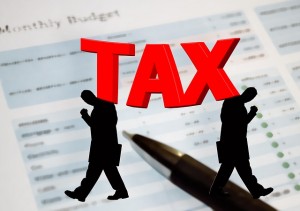Taxes are hard enough to calculate for the average American, and now the Internal Revenue Service (IRS) has introduced a new proposal to redefine the gambling tax rules for play on slot machines. The proposal would alter the way a single session of gaming is defined, and how gains and losses should be adjusted.
 The new gambling tax was included in a measure from the IRS known as Notice 2015-21, titled ‘Safe Harbor Method for Determining a Wagering Gain or Loss from Slot Machine Play’. The bill would amend 26 CFR Section 61, Gross Income Defined. According to the Safe Harbor method, individuals would be able to “determine a wagering gain or loss” from slot machines.
The new gambling tax was included in a measure from the IRS known as Notice 2015-21, titled ‘Safe Harbor Method for Determining a Wagering Gain or Loss from Slot Machine Play’. The bill would amend 26 CFR Section 61, Gross Income Defined. According to the Safe Harbor method, individuals would be able to “determine a wagering gain or loss” from slot machines.
Under current law, Notice 2015-21 states, “Section 61 of the Internal Revenue Code provides that gross income means all income from whatever source derived… Gains from wagering transactions are included in gross income.”
The new gambling tax rules would define “transactions” as single sessions played in a single day at a single establishment. The exact definitions of single session, gain and loss are laid out as follows:
Definition of Single Session of Play, Gain and Loss
Notice 2015-21 defines a Single Session of Play as:
| “A session of play begins when a patron places the first wager on a particular type of game and ends when the same patron completes his or her last wager on the same type of game before the end of the same calendar day… the time is determined by the time zone of the location where the patron places the wager. A session of play is always determined with reference to a calendar day (24-hour period from 12:00 a.m. through 11:59 p.m.) and ends no later than the end of that calendar day.” |
Wagering Gain is defined as:
| A taxpayer recognizes a wagering gain if, at the end of a single session of play, the total dollar amount of payouts from electronically tracked slot machine play during that session exceeds the total dollar amount of wagers placed by the taxpayer on electronically tracked slot machine play during that session; |
Example: Wager $20, end session with $30, Gain = $10
Wagering Loss is defined as:
| A taxpayer recognizes a wagering loss if, at the end of a single session of play, the total dollar amount of wagers placed by the taxpayer on electronically tracked slot machine play exceeds the total dollar amount of payouts from electronically tracked slot machine play during that session. |
Example: Wager $20, end session with $5, Loss = $15
The gambling tax rules also notes that, “A taxpayer must use the same session of play if the taxpayer stops and then resumes electronically tracked slot machine play within a single gaming establishment during the same calendar day.”
Purpose of the New Gambling Tax on Slot Machines
If filing taxes is confusing enough to begin with, why obfuscate matters? “The Internal Revenue Service (Service) and the Treasury Department are aware that determining the amount of a wagering gain or loss from slot machine play is burdensome for taxpayers and sometimes creates controversy between taxpayers and the Service,” reads the proposal.
“This controversy is complicated by changes in gambling technology. The increased use of electronic gambling, with the development of player’s cards and tickets, has curtailed the redemption of tokens by slot machine players.” In other words, the IRS is looking for a more precise way to tax “electronically tracked” play on slot machines.
Before implementing the new gambling tax rules, the IRS and Treasury are requesting “comments from the public regarding the optional safe harbor method”. The proposal asks specifically for:
- alternative definitions for the term “slot machine”
- whether an interruption in play, such as leaving the gaming area for over 15 minutes, should affect the determination of what constitutes a single session of play
- whether a session of play should be based on a period other than a calendar day…
- whether the definition of a single session of play should be determined by other factors, such as the duration of a trip or by each slot machine played…
- whether the safe harbor should include payouts in the form of merchandise and bonus rewards…
- whether the topic is appropriate for the Industry Issue Resolution (IIR) program…
- (7) whether a safe harbor method to determine a wagering gain or loss should be developed for other forms of gambling…
- whether any aspects of the optional safe harbor pose problems of administrability for stakeholders…
Comments on the proposed gambling tax rules may be emailed to Comments@irscounsel.treas.gov no later than July 1, 2015, and must include the subject line “Notice 2015-21”.
